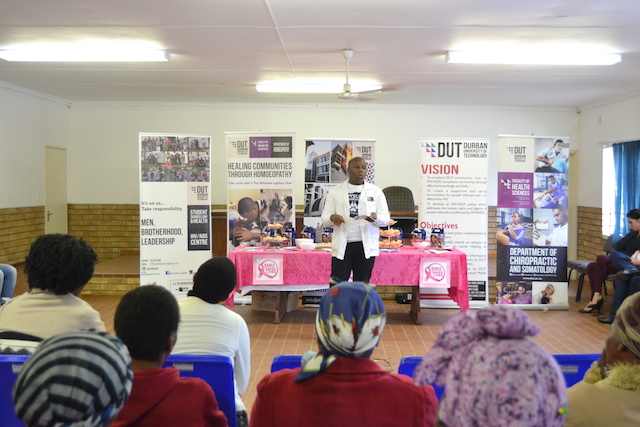The Durban University of Technology’s Faculty of Health Sciences together, with the eThekwini District Department of Health and the Department of Cooperative Governance and Traditional Affairs (CoGTA), recently hosted a Health Wellness Day at Mkhizwana Village in Cato Ridge, under the chieftaincy of Her Majesty the Queen Shangase.
The event was aimed at raising awareness on the increasing incidences of breast cancer among South African women. According to the Department of Health 2016 report (DoH 2016), breast cancer is one of the most common cancers among women in South Africa, the most prevalent cancer amongst the White and Asian women and the second most common cancer among black and coloured women.
The Cato Ridge programme which has been running from April 2016 to date, aims not only at raising awareness of Breast cancer but to also to make access to healthcare a reality to rural communities.
“The engagement programmes of this nature are important to our communities. It is through these platforms that the health care professionals can sit down and engage with communities at a human level so that patients are empowered and are not mere passengers on the road to healthcare,” said Dr Euvette Taylor Project/Clinic Manager.
He also stated that the project would not have been productive without the commitment from the DUT Faculty of Health Sciences, the eThekwini District Department of Health and the Department of Cooperative Governance and Traditional Affairs (CoGTA).
Facts about Breast Cancer
- Early detection of the condition can lead to effective treatment and a positive prognosis
- About 90% of patients survive for many years after diagnosis when breast cancer is detected at the early stages.
- Regular self-breast examinations and regular mammograms are the key to early detection.
- Presenting yourself early for treatment may result in more effective treatment, leading to a reduction in pain and suffering and a significant decrease in the loss of life. (DoH 2016).
-Pictured: DUT student, Smiso Ncube, at the event.
—–Phumeza Msongelwa


